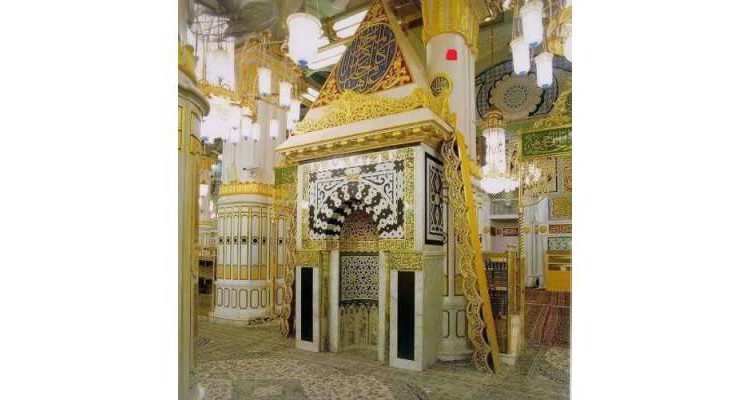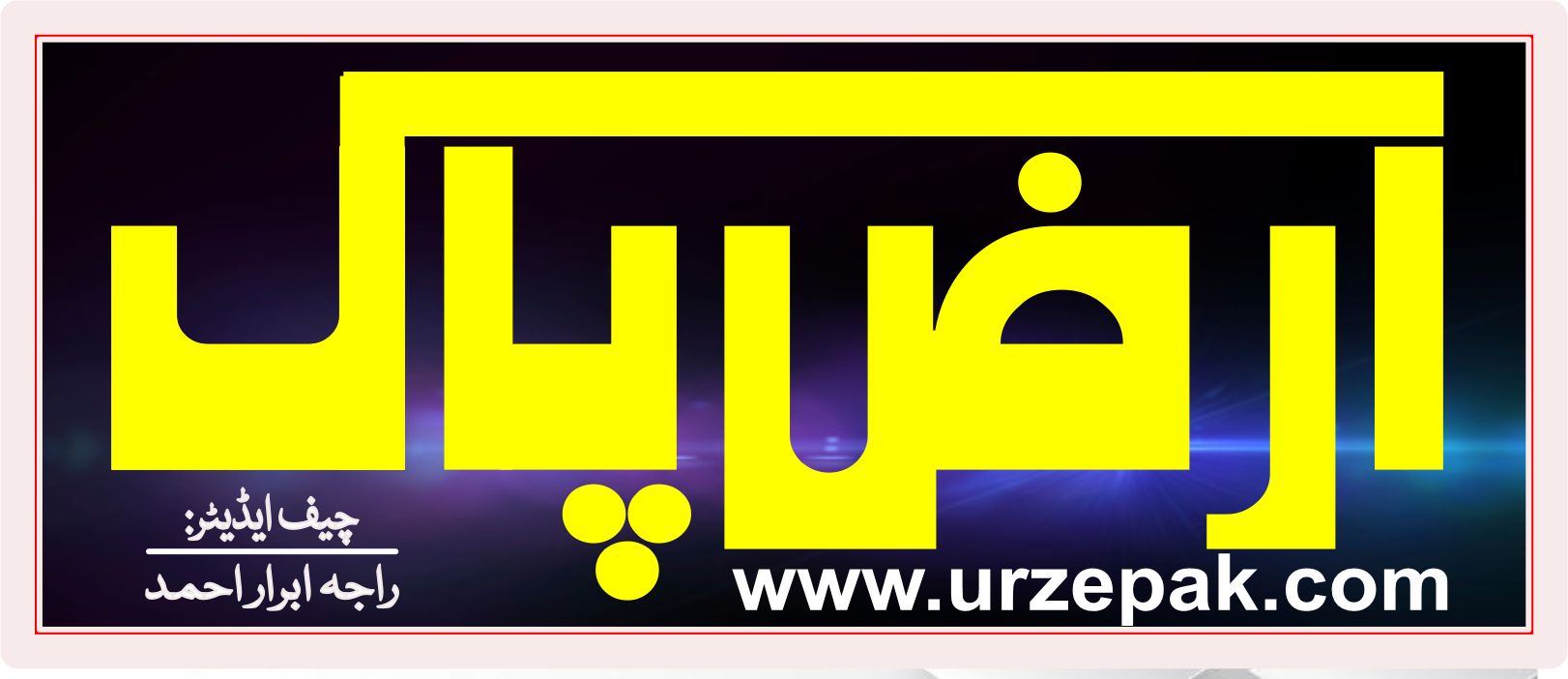
جدائی کا صدمہ
منبرِ رسول اللہ صلی اللہ علیہ وآلہ وسلم بننے سے پہلے حضور پُرنور صلی اللہ علیہ وآلہ وسلم خشک کھجور کے تنے سے ٹیک لگا کر خطبہ ارشاد فرمایا کرتے تھے۔
جب پختہ منبرِ رسول اللہ صلی اللہ علیہ وآلہ وسلم تیار ہو گیا اور آپ صلی اللہ علیہ وآلہ وسلم منبر پر تشریف فرما ہوئے تو خشک کھجور کے تنے سے یہ صدمہ جدائی برداشت نہ ہوا۔اس نے اس طرح رونا شروع کیا جس طرح چھوٹا بچہ ماں کی جدائی سے روتے ہوئے سسکیاں لیتا ہے۔مولانا رومی رحمتہ اللہ علیہ فرماتے ہیں،خشک کھجور کا تنا جس کا نام استونِ حنانہ تھا،رسول اللہ صلی اللہ علیہ وآلہ وسلم کی جدائی سے نالہ کر رہا تھا۔ مثل اربابِ عقول کے یعنی جیسے کہ وہ کوئی انسان ہو۔اس آوازِ گریہ سے ․․․اصحاب رسول صلی اللہ علیہ وآلہ وسلم تعجب میں پڑ گئے کہ یہ ستون اپنے پورے حجم طول و عرض سے کس طرح رو رہا ہے۔
آپ صلی اللہ علیہ وآلہ وسلم نے دریافت کیا”اے ستون تجھے کیا ہوا ہے؟“اس نے عرض کیا”یا رسول صلی اللہ علیہ وآلہ وسلم آپ صلی اللہ علیہ وآلہ وسلم کی جدائی کا صدمہ مجھ سے برداشت نہیں ہوا۔آپ صلی اللہ علیہ وآلہ وسلم کی جدائی سے میری جان اندر ہی اندر جل رہی ہے۔اس آتشِ غم کے ہوتے ہوئے آپ صلی اللہ علیہ وآلہ وسلم کے فراق میں کیوں نہ آہ و فغاں کروں یا رسول اللہ صلی اللہ علیہ وآلہ وسلم آپ صلی اللہ علیہ وآلہ وسلم ہی تو جانِ کائنات ہیں۔آپ صلی اللہ علیہ وآلہ وسلم پہلے مجھ سے ٹیک لگاتے تھے اب مجھ سے الگ ہو گئے ہیں اور میری جگہ دوسرا منبر پسند فرما لیا ہے“۔
حضورِ انور صلی اللہ علیہ وسلم نے ارشاد فرمایا:
”ارے مبارک ستون اگر تُو چاہتا ہے تو تیرے لئے دعا کروں کہ تو سر سبز اور ثمر آور درخت ہو جائے اور تیرے پھلوں سے ہر شرقی و غربی مستفید ہو اور کیا تُو ہمیشہ کے لئے ترو تازہ ہونا چاہتا ہے،یا تُو پھر عالمِ آخرت میں کچھ چاہتا ہے۔“استون حنانہ نے کہا”یا رسول اللہ صلی اللہ علیہ وآلہ وسلم!میں تو دائمی اور ابدی نعمت چاہتا ہوں“۔
مولانا روم رحمتہ اللہ علیہ فرماتے ہیں:اے غافل!تمہیں اس لکڑی سے سبق لینا چاہیے کہ تم انسان ہو کر دنیائے فانی پر گرویدہ اور آخرت سے رُو گرداں ہو رہے ہو جبکہ استون حنانہ نعمتِ دائمی کو نعمتِ فانی پر ترجیح دے رہا ہے۔
ترجمہ:
(پھر اس ستونِ حنانہ کو زمین میں دفن کر دیا گیا تاکہ مثل انسانوں کے روزِ جزا اس کا حشر ہو۔)
Abrar Ahmed is not just a journalist — he is a chronicler of his time. A Kashmiri journalist, columnist, novelist, and author, he has spent his life wrestling with ideas, questioning power, and giving voice to the voiceless. Armed with a Master’s degree in International Law, he brings intellectual depth and moral clarity to every piece he writes. His education at the University of Azad Kashmir Muzaffarabad and Quaid-i-Azam University shaped his analytical mind, but it is his lived experience that sharpened his pen.
Abrar has been a tireless campaigner for human rights, equality, and justice, speaking out against oppressive systems of governance and entrenched corruption in many Asian countries. He has consistently raised his voice for the deprived and oppressed people of Kashmir, making their struggle for dignity and freedom heard on global platforms.
Today, he resides in Dublin, Ireland, where his perspective has widened, allowing him to view Kashmir’s pain and the world’s conflicts through a sharper, more global lens.
He is the founder of the Institute of Research for Conflict Resolution and Social Development, Ikhtilaf News Media and Publications, and the Daily Sutoon Newspaper — institutions built not just to inform, but to challenge, to provoke, to awaken. His humanitarian vision led to the creation of the Save Humanity Foundation, a reflection of his belief that words must lead to action.
His books are not mere collections of pages — they are manifestos of conscience:
Tehreek-e-Azadi ke Azeem Surkhaik — a tribute to those who gave everything for freedom.
Corruption ke Keerhay — a fearless dissection of the rot eating away at society.
Masla-e-Kashmir ka Hal: Aalmi Aman ka Rasta — a bold attempt to chart a path to peace.
Pakistan and Azad Kashmir Political System and New System Needed — a demand for reform, justice, and a future worthy of its people.
Through his textbooks Modern Community Development Ideas and Basic Journalism, Abrar has shaped generations, giving young minds the tools to see the world critically and act with purpose.
Born on March 19, 1982, Abrar Ahmed stands as a voice of resistance and renewal. His work is not just journalism — it is an ongoing struggle for truth, for peace, and for a just society. To read him is to confront the questions we are too often afraid to ask, and to believe, even in dark times, that words can still change the world.
